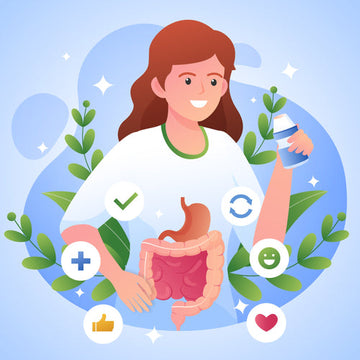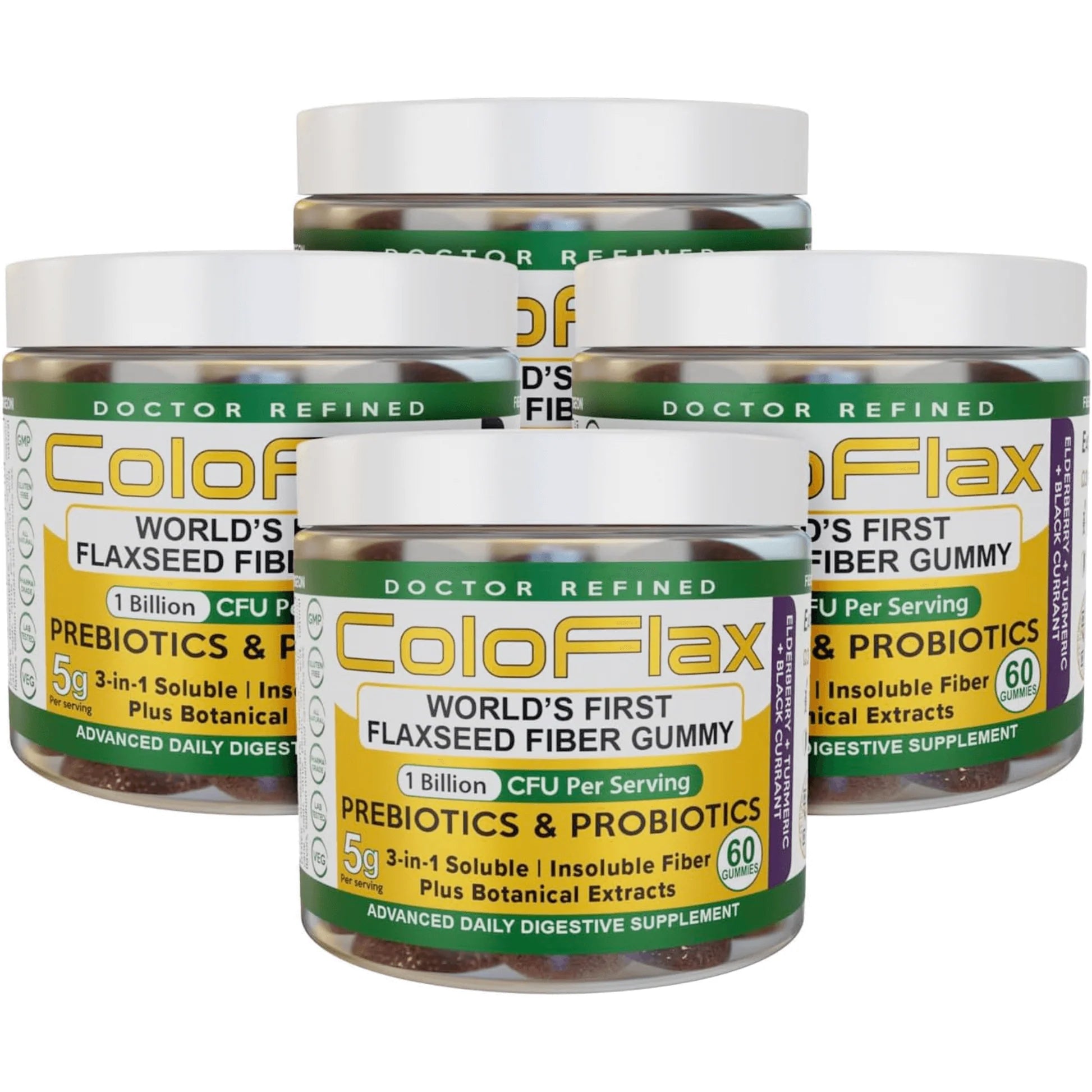You are what you eat, as the saying goes, and your diet has a massive impact on your physical health and mental health. It also plays an important role in your longevity.
Eating the right foods and avoiding the wrong ones could add years to your life. In the following guide, we’ll address what the “right” foods are, giving you some helpful pointers as you seek to improve your diet.
Flaxseeds
Flaxseeds are incredible. We have spoken about these seeds many times before and they also feature in our flaxseed fiber gummy.
It’s fair to say that we’re passionate about flaxseeds.
So, what makes them so special?
Flaxseeds contain compounds such as lignans and omega-3 fatty acids, as well as high levels of fiber. Studies suggest that these potent little seeds could play an important role in enhancing longevity by “alleviating the common health challenges like hypertension, cancer and diabetes.”(1)
Flaxseeds taste great and they are easy to add to your diet. Sprinkle them on stews, salads, oatmeal, and other suitable dishes. And if you don’t like whole seeds, look for ground flaxseed instead.
Fatty Fish
Fatty fish like salmon, mackerel, and trout are even better sources of omega-3 fatty acids than flaxseeds. These fish form a major part of the Mediterranean diet, which is one of the healthiest diets in the world.
Eating a couple of servings of fatty fish a week could add several years to your life, mainly due to the way in which it supports cardiovascular health.(2)
Fatty fish is also high in protein and several key minerals.
Just bear in mind that while tinned fish (sardines, anchovies) contain high levels of omega-3 fatty acids, they can also be very high in sodium and may contain added vegetable oils.
Tea
According to a study of over 100,000 participants, habitual tea drinkers have a “29% decreased risk of all-cause death” and a massive “56% lower risk of fatal heart disease and stroke”.
These results were published in the European Journal of Preventive Cardiology, and make great reading for tea drinkers.(3)
It should also be noted that while green tea is often singled out as the healthiest type of tea, countless studies have suggested that black tea and white tea drinkers can reap the same benefits.
As long as you’re drinking tea several times a week, it doesn’t really matter whether it’s black, green, or white.
There are also many benefits to drinking herbal teas. They come from different plants and so they contain different compounds, but many of them are still high in antioxidants, with some of the most promising including nettle, dandelion, chamomile, lemon balm, peppermint, hibiscus, and echinacea.
Cruciferous Vegetables
Cruciferous vegetables like broccoli and Brussels sprouts are hated by children and tolerated by adults the world over. If you can’t bear the slightly bitter and earthy taste of these green vegetables, you could be missing out, as they are some of the healthiest foods that you can eat.
Consumption of cruciferous vegetables is associated with “improved cardiovascular health and overall longevity” according to a study conducted on over 134,000 Chinese adults. (4)
They are packed with fiber, protein, minerals, vitamins, and antioxidants, and may help to support digestive and immune health, as well as cardiovascular health.
If that’s not enough to convince you to eat these divisive vegetables, try some different cooking techniques. Oftentimes, our hatred of certain foods comes from bad childhood experiences, such as being forced to eat a plate of steamed sprouts or boiled broccoli.
If you try roasting them with a little garlic, adding some butter or olive oil, and eating them with some pancetta, it’ll be a different experience entirely and could make you look at cruciferous vegetables in a new light.
Whole Grains
Whole grains are literally the whole of the grain. When grains like wheat are processed, the germ and bran are removed. These parts of the kernel are loaded with antioxidants, vitamins, minerals, and fiber, but they also shorten the shelf life, so manufacturers get rid of them.
By eating products that contain whole grains, you’ll be consuming all of those added nutrients and reaping the benefits that come with them.
Previous studies on whole grains have suggested that they could help to improve digestion and reduce mortality risk, among other health benefits. One study, for instance, found that people who consumed 3 additional servings of whole grains a day were 25% less likely to suffer from cardiovascular disease.(5)
The study concluded that there was an “inverse association between whole-grain intake and mortality from all causes, cardiovascular disease, and total cancers.”
Take a look at our guide to the benefits of whole grains to learn more.
Olive Oil
Olive oil is rich in monosaturated fats and high in antioxidants. It is a staple of the Mediterranean diet and is used abundantly throughout Greece, Italy, Spain, and France. It’s also more common in the United States these days, although we are still heavily reliant on vegetable oils that simply don’t possess the same nutrient properties or benefits.
A study on over 840,000 subjects found that olive oil was the only type of monounsaturated fatty acid that could reduce mortality risk, and the results were quite notable, with 17% less chance of stroke and 12% less chance of cardiovascular mortality overall.(6)
Olive oil can be used in place of vegetable oil. You can cook with it, bake with it, and drizzle it on salads. If you’ve ever been to the Med you’ll know that they are pretty liberal with their olive oil use—that’s the best way to be!
Garlic
When you think of superfoods, your mind likely jumps to fruits and vegetables—brightly colored, nutrient-packed foods that are loaded with nutrients. But garlic is just as deserving of the superfood moniker.
One of the most interesting studies on garlic and longevity spanned tens of thousands of old-age participants from 1998 through to 2011. It measured their garlic consumption before the study and then checked in with them throughout.(7)
At the end, it noted that higher garlic consumption was associated with a reduced risk of mortality.
Garlic contains vitamins C and B6, as well as minerals like selenium and manganese, but the main benefits are likely derived from its antioxidant content. It contains a compound known as allicin, which has been linked with a wide variety of health benefits, including lowering blood pressure, reducing cholesterol levels, and assisting with the immune system.(8)
Berries
Blueberries are potent antioxidants and a regular serving could help to support overall health and well-being. They are also high in many essential nutrients and have been linked to a wide variety of health benefits.
But blueberries aren’t the only “superfruit” out there. Raspberries and blackberries are also very good for you. These berries are often overlooked in the superfood department, but they are a rich source of antioxidants and contain around 8g of fiber per serving (about 70 calories).
If you don’t have access to fresh fruit or find that it keeps expiring before you get around to eating it, just buy frozen berries instead. They don’t taste as good, and they lose a lot of the sweetness and firmness, but they make for a great addition to oatmeal, fruit salads, and other dishes and they are just as good for you.
Turmeric
You’ve almost certainly heard of turmeric. It’s one of the hottest superfoods right now and it has remained in the spotlight for several years. It’s everywhere, and not without reason.
Turmeric is a root used as a spice in Indian cuisine. It’s the ingredient that gives curry its strong yellow color—the same color you’ll have all over your fingers and countertops if you ever try grating or peeling it. It also contains a compound known as curcumin, and this is where its many health benefits come from.
Curcumin is the main active ingredient in turmeric and has been linked with various health benefits. It has been suggested as a complementary treatment for everything from chronic pain to memory issues and it can also support heart, digestive, and immune health.
Just as importantly, turmeric is very cheap and widely available. You can take it in the form of a supplement, buy the powder from your local grocery store, or pick up some whole roots.
If you’re taking turmeric, there are a couple of things to keep in mind.
Firstly, curcumin is fat soluble, so many nutritionists recommend taking it with a high-fat meal. You don’t need to go overboard and start drizzling olive oil into your smoothie, but if you’re making a turmeric tea or latte, consider adding a little cream or whole milk.
It should also be taken with black pepper, as the active ingredient in pepper (piperine) greatly increases bioavailability and ensures maximum absorption.(9)
Fermented Food
Kefir, sauerkraut, kimchi, and other fermented foods work wonders for your gut health. They support your gut microbiome, which in turn could assist with everything from regularity and immune health to improved cholesterol levels.
These foods are often low-fat and low-calorie. They also contain many vitamins, minerals, and antioxidants. In the case of kefir, it’s high in protein and loaded with probiotics. As for sauerkraut and kimchi, they have both probiotics and fiber and can be added to many savory dishes.
Good health often starts with your gut. Pay attention to what’s happening down there and support your digestive health—it could add years to your life.
What Foods Should You Avoid?
Naturally, anything that increases your risk of heart disease should be avoided. It is the biggest killer in the United States and it’s primarily linked to diet and lifestyle factors.
Fast food, highly processed food, and fried food can all increase your risk of cardiovascular disease and may shorten your life if eaten excessively and frequently. It’s okay to enjoy the occasional Big Mac or pizza, but if you’re eating these foods every day, you could be putting your health at risk.
Try to limit your intake of saturated fat, avoid trans fats, and watch out for anything with a high salt and sugar content.
If you smoke, stop; if you drink a lot of alcohol, cut back. A good diet can work wonders for your health and longevity, but it can’t undo the damage caused by smoking and long-term alcohol indulgence.
For more helpful information, check out our guide to the dangers of eating fast food, as well as this one on the benefits of a whole-food vegan diet.
References
- https://www.researchgate.net/publication/353639225_A_Review_on_Flax_Seed_A_Legume_for_Longevity
- https://academic.oup.com/ajcn/article/114/4/1447/6301120
- https://www.sciencedaily.com/releases/2020/01/200109105508.htm
- https://pubmed.ncbi.nlm.nih.gov/21593509/
- https://www.ncbi.nlm.nih.gov/pmc/articles/PMC5105035/
- https://pubmed.ncbi.nlm.nih.gov/25274026/
- https://www.ncbi.nlm.nih.gov/pmc/articles/PMC6683033/
- https://www.ncbi.nlm.nih.gov/pmc/articles/PMC6271412
- https://pubmed.ncbi.nlm.nih.gov/9619120/






